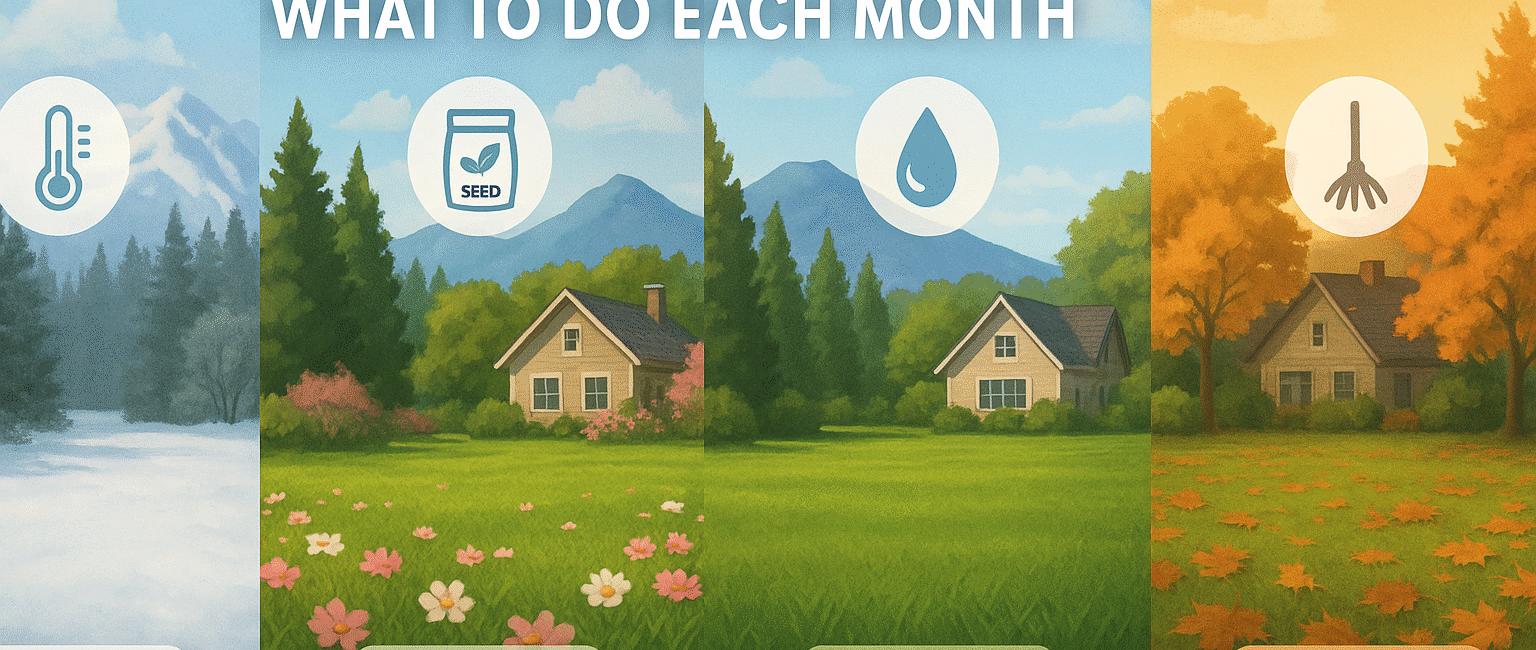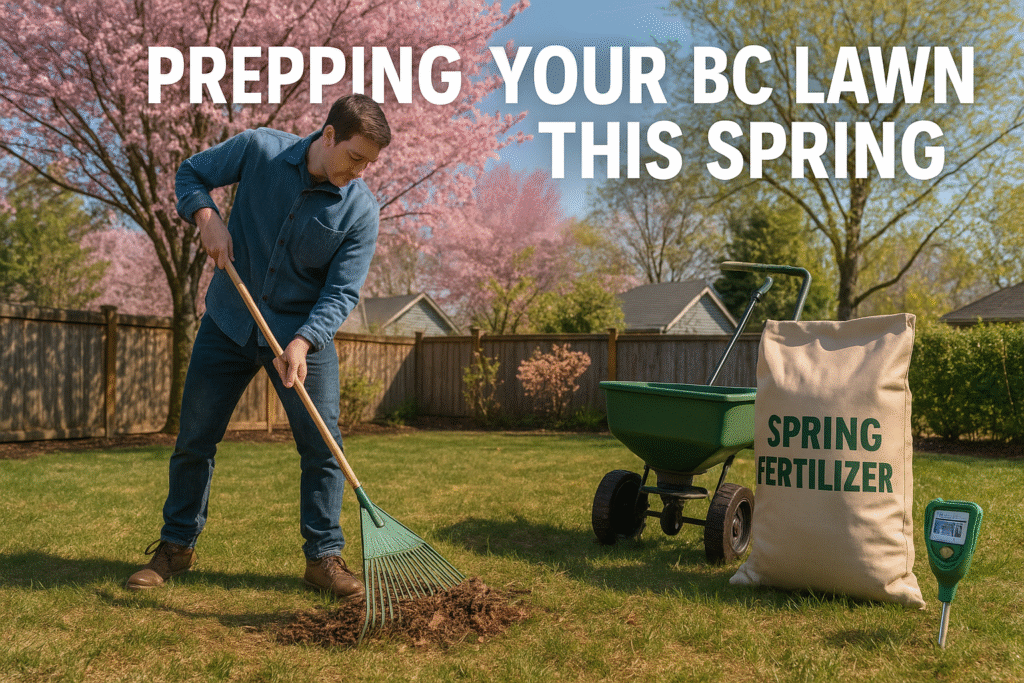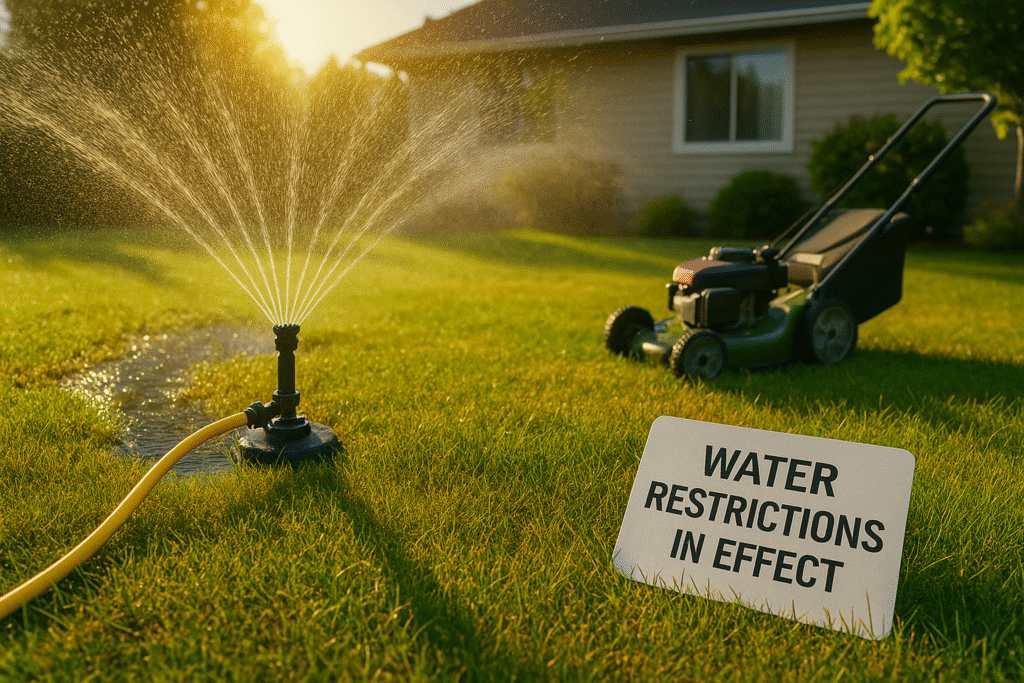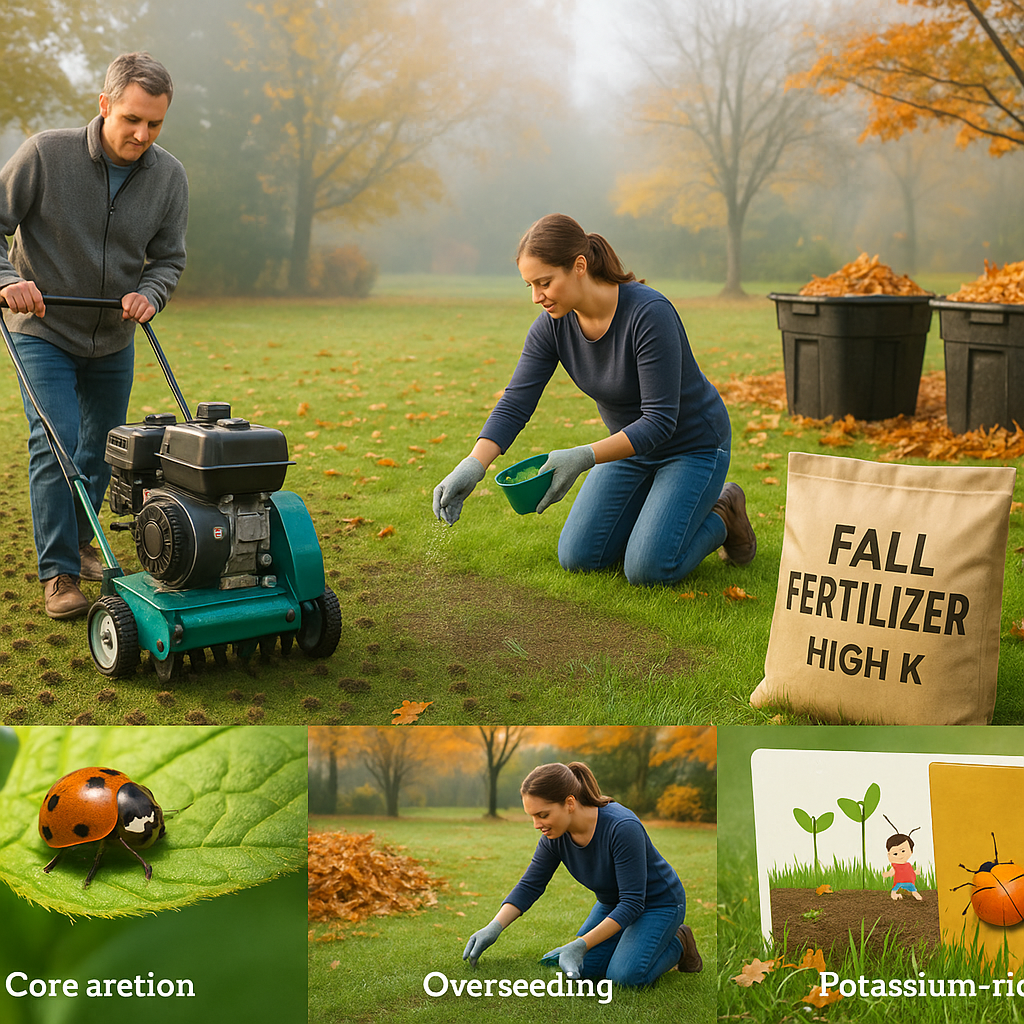
Are you tired of guessing when to fertilize, seed, or winterize your lawn in British Columbia? With BC’s unique climate ranging from coastal rainforests to dry interior valleys, timing your lawn care perfectly can make the difference between a lush green paradise and patchy disappointment.
This comprehensive lawn care calendar BC guide breaks down exactly what your lawn needs each month, taking into account BC’s diverse microclimates and weather patterns. Whether you’re in Vancouver dealing with wet winters or Kamloops managing hot, dry summers, these year-round lawn tips will keep your grass healthy and beautiful all season long.
🌸 Spring Lawn Care in BC (March – May)
March: Wake Up Your Lawn
Spring arrives differently across BC, but March is typically when you’ll start seeing signs of life in your grass.
Key Tasks:
- Clean up winter debris – Remove leaves, branches, and any accumulated organic matter
- First inspection – Look for winter damage, bare spots, and signs of disease
- Soil testing – Check pH levels (ideal range: 6.0-7.0 for most BC grasses)
- Equipment maintenance – Service your mower, sharpen blades, and check irrigation systems
BC-Specific Tip: In coastal areas like Vancouver and Victoria, you can start earlier due to milder temperatures. Interior regions should wait until snow has completely melted and soil isn’t waterlogged.
April: Spring Awakening 🌱
April is prime time for major spring lawn care activities across most of BC.
Key Tasks:
- Overseeding – Fill in bare patches with grass seed suitable for your region
- First fertilization – Apply a balanced spring fertilizer (look for 4-1-2 or 3-1-2 ratio)
- Dethatching – Remove excess thatch buildup if it’s more than ½ inch thick
- Weed prevention – Apply pre-emergent herbicide before soil temperature reaches 16°C
Grass Types for BC:
- Coastal regions: Perennial ryegrass, fine fescue
- Interior regions: Tall fescue, drought-resistant blends
- Mountain areas: Hardy fescue varieties
May: Growth Mode Activated
Your lawn should be actively growing by May throughout BC.
Key Tasks:
- Regular mowing begins – Cut no more than 1/3 of grass height
- Watering schedule – Deep, infrequent watering (1-1.5 inches per week)
- Spot weed treatment – Hand-pull or spot-treat emerging weeds
- Monitor for pests – Watch for crane fly larvae and other common BC lawn pests

☀️ Summer Lawn Care in BC (June – August)
June: Maintenance Mode
Summer lawn care in BC requires balancing growth with water conservation, especially in drier regions.
Key Tasks:
- Raise mowing height – Keep grass 2.5-3 inches tall to retain moisture
- Deep watering – Water early morning (5-9 AM) to reduce evaporation
- Summer fertilization – Apply slow-release fertilizer if needed
- Weed control – Continue spot-treating broadleaf weeds
Water-Wise Tips for BC: Many BC municipalities have water restrictions. Consider drought-resistant grass varieties and efficient irrigation systems.
July: Heat Stress Management 🌡️
July brings peak heat across BC, requiring careful lawn management.
Key Tasks:
- Adjust watering – Increase frequency during heat waves
- Mow higher – Raise cutting height to 3-4 inches for heat protection
- Avoid fertilizing – Skip fertilizer during extreme heat periods
- Monitor for disease – Watch for summer patch and dollar spot
Regional Considerations:
- Lower Mainland: Focus on humidity-related fungal issues
- Interior BC: Emphasize drought stress prevention
- Coastal Islands: Maintain consistent moisture levels
August: Preparation for Fall
Late summer is crucial for preparing your lawn for BC’s fall growing season.
Key Tasks:
- Continue deep watering – Don’t let up on irrigation
- Plan fall overseeding – Order seed for September application
- Pest monitoring – Check for chafer beetle grubs
- Equipment prep – Prepare for increased fall maintenance

🍂 Fall Lawn Care in BC (September – November)
September: Prime Growing Season
Fall is actually the best time for lawn care in BC due to cooler temperatures and increased rainfall.
Key Tasks:
- Overseeding – Perfect time for new grass establishment
- Fall fertilization – Apply phosphorus-rich starter fertilizer
- Soil aeration – Core aerate compacted areas
- Weed control – Target perennial weeds before winter
Why Fall is Best: Cooler temperatures and natural rainfall create ideal conditions for grass growth and root development.
October: Final Preparations 🍁
October lawn care focuses on winter preparation while maximizing fall growth.
Key Tasks:
- Last fertilization – Apply winter fertilizer with potassium
- Leaf management – Remove or mulch fallen leaves regularly
- Final overseeding – Last chance for new grass establishment
- Irrigation adjustment – Reduce watering as temperatures drop
November: Winter Prep
November marks the transition to winter lawn care across most of BC.
Key Tasks:
- Final mow – Cut grass slightly shorter (2 inches) for winter
- Complete leaf removal – Don’t let leaves smother grass
- Winterize irrigation – Shut off and drain sprinkler systems
- Tool maintenance – Clean and store equipment properly

❄️ Winter Lawn Care in BC (December – February)
December – February: Dormancy Period
While grass growth slows significantly, winter lawn care in BC isn’t completely hands-off.
Key Tasks:
- Minimize foot traffic – Avoid walking on frozen or snow-covered grass
- Continue leaf removal – Clear any remaining debris
- Plan next year – Research new varieties, order supplies
- Equipment servicing – Professional mower maintenance during downtime
Coastal vs. Interior Winter Care:
- Coastal areas: Grass may continue slow growth; occasional light mowing may be needed
- Interior regions: Complete dormancy; focus on planning and equipment maintenance
💡 Pro Tips for BC Lawn Success
Understanding BC’s Microclimates
BC’s diverse geography means lawn care timing can vary significantly:
- Coastal regions (Vancouver, Victoria): Milder temperatures allow for extended growing seasons
- Interior valleys (Kelowna, Kamloops): Hot, dry summers require drought-resistant strategies
- Northern BC: Shorter growing season, focus on hardy grass varieties
- Mountain areas: Altitude affects timing; adjust schedule based on local conditions
Water Management Strategies 💧
BC’s water restrictions make efficient irrigation crucial:
- Drip irrigation – Most efficient for established lawns
- Rain sensors – Automatically adjust watering based on precipitation
- Drought-resistant varieties – Reduce overall water needs
- Mulching mowers – Return moisture-retaining clippings to soil
Common BC Lawn Challenges
- Moss growth – Common in shady, wet areas; improve drainage and sunlight
- Crane fly damage – Preventive treatments in late summer/early fall
- Winter damage – Salt damage near roads; rinse affected areas in spring
- Thatch buildup – BC’s wet climate can promote excess thatch
🔧 Essential Tools for BC Lawn Care
Having the right equipment makes following your lawn care calendar BC much easier:
- Quality mower – Mulching capability preferred
- Spreader – For even fertilizer and seed application
- Aerator – Core aerator for annual soil improvement
- Soil thermometer – Track soil temperature for timing applications
- pH test kit – Monitor soil acidity levels
📞 Ready to Transform Your BC Lawn?
Following this comprehensive lawn care calendar BC will definitely improve your lawn’s health and appearance. However, sometimes you need professional expertise to tackle specific problems or achieve that perfect lawn you’ve been dreaming of.
Whether you need spring cleanup, pest control, irrigation installation, or complete lawn renovation, finding the right local expert makes all the difference. Don’t spend hours researching contractors or wondering if you’re getting quality service.
Visit BCServiceFinder.ca today to get matched with top-rated lawn care professionals in your area. Compare quotes, read verified reviews, and choose the perfect fit for your lawn care needs. From Vancouver to Victoria, Kelowna to Prince George – find trusted local experts who understand BC’s unique lawn care challenges.
❓ Frequently Asked Questions
When should I start fertilizing my lawn in BC?
Begin fertilizing in April once soil temperature consistently reaches 10°C. Coastal areas can start earlier than interior regions. Use a balanced spring fertilizer with a 4-1-2 or 3-1-2 NPK ratio for best results.
What’s the best grass type for BC’s climate?
It depends on your region. Coastal areas do well with perennial ryegrass and fine fescue, while interior BC benefits from tall fescue and drought-resistant blends. Mountain areas should choose hardy fescue varieties that can handle temperature extremes.
How often should I water my lawn during BC summers?
Water deeply 2-3 times per week, providing 1-1.5 inches total. Water early morning (5-9 AM) to minimize evaporation. Adjust frequency based on local water restrictions and rainfall patterns.
When is the best time to overseed in BC?
September is ideal for overseeding across BC. The cooler temperatures and increased rainfall create perfect conditions for seed germination and establishment before winter dormancy.
Should I remove leaves from my lawn in fall?
Yes, remove or mulch leaves regularly throughout fall. While light leaf cover can provide some benefits, thick layers will block sunlight and promote fungal diseases. Use leaves as compost or mulch in garden beds instead.
🌟 Found this lawn care calendar BC guide helpful? Share it with your friends and neighbors on Facebook so they can achieve beautiful, healthy lawns too! A little knowledge sharing goes a long way in creating gorgeous BC neighborhoods. 🏡💚


